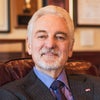Why Soft Skills Make Strong Networks It is possible to do well, by doing good.
By Ivan Misner
Opinions expressed by Entrepreneur contributors are their own.

I'm not much of a "new-age" guy. Yet, I believe in the immense power of the Law of Reciprocity. This concept touches upon the deep-rooted psychological urge to do something nice for someone who did something nice for you.
There is certainly value in soft skills, but if you would like to see some evidence as to why those skills work, I can tell you there's a lot out there to support the Law of Reciprocity, starting with the Nash equilibrium theory (the acronym of which is, ironically, NET).
Nash's equilibrium theory basically states that the best result will come when everyone in the group is doing what is best for both themselves and the group -- a form of reciprocity. The optimal outcome of a situation is one where no individual has an incentive to deviate from their chosen strategy after considering the other participant's choices.
Reciprocal altruism is another form of reciprocity. It involves an equitable balance between collective altruism and personal need. Collective altruism looks at the needs of the group but doesn't give strong consideration to the needs of the individual. Reciprocal altruism attempts to consider both.
In early writings by Socrates and Alexis de Tocqueville on ethics and government, the concept of enlightened self-Interest was all about reciprocity. Enlightened self-interest is a philosophy which states that people who act to further the interests of others, or interests of the group or groups to which they belong, ultimately serve their own self-interest. In other words, it is possible to do well, by doing good.
As I grew my company BNI, I incorporated the use of the term, Givers Gain® into the lexicon of our operations from the very beginning. The underlying foundation of this term is predicated on the age-old concept of "what goes around, comes around." But it's more complex than that.
Networking is about relationship building. I have found that the best way to build a relationship with someone quickly is to help them first. If you can help someone -- and I'm not talking about selling them your product or service, I mean genuinely help them -- by giving them an introduction, information, article, really anything that serves their need, and you will begin a professional relationship with them.
Creating a relationship helps build trust. Trust is the cornerstone of effective networking. When you practice Givers Gain often enough, you will be on the road to building a powerful personal network predicated on trust, built through helping to serve someone else.
This concept, whatever term you choose to use, serves as a bridge between individuals and a community of people for collaboration of all kinds, and it fuels individual and professional growth – not to mention increased referrals and business.
Research has shown that social cooperation is rewarding to our brains. Cooperation increases the frequency of dopamine release within the brain. Interestingly, dopamine decreases without social cooperation. Each of the above strategies are about cooperation and collaboration, and each can increase dopamine production.
Some time ago, I received an email from Amruth, a BNI member in India with a great metaphor for this philosophy. He said words to the effect of: imagine that you have two spoons, a small spoon and a large serving spoon. Which one are we using the most? The small spoon serves only us, but the large spoon allows us to serve others. The more that we all use the large spoon, the more we will all have plenty for the small spoon.
A networking group using the large spoon for everyone creates amazing success for all. In the book Go Giver, co-written by my friend, Bob Burg, the authors say, "Your income is determined by how many people you serve and how well you serve them."
Call it Nash's equilibrium, reciprocal altruism, enlightened self-interest, or Givers Gain: I believe that reciprocity is about taking off your bib and putting on your apron. This kind of networking is where individuals enter, and communities emerge.










